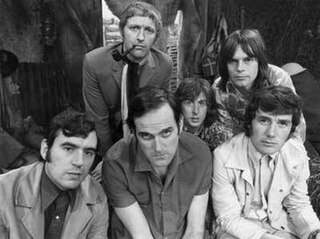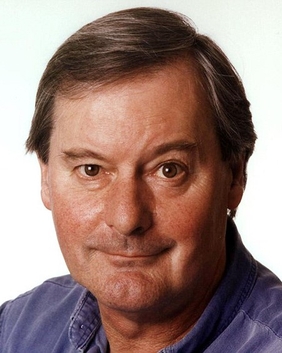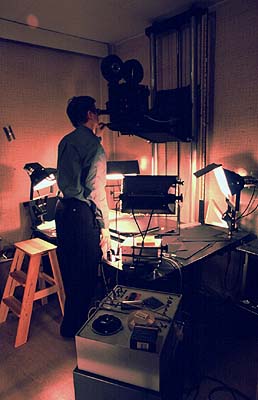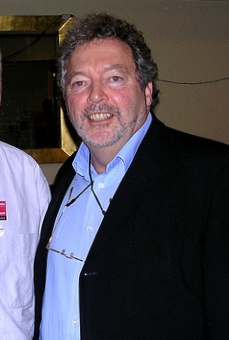Related Research Articles

Monty Python were a British comedy troupe formed in 1969 consisting of Graham Chapman, John Cleese, Terry Gilliam, Eric Idle, Terry Jones, and Michael Palin. The group came to prominence for the sketch comedy series Monty Python's Flying Circus, which aired on the BBC from 1969 to 1974. Their work then developed into a larger collection that included live shows, films, albums, books, and musicals; their influence on comedy has been compared to the Beatles' influence on music. Their sketch show has been called "an important moment in the evolution of television comedy".

Ronald William George Barker was an English actor, comedian and writer. He was known for roles in British comedy television series such as Porridge, The Two Ronnies, and Open All Hours.

Barry Charles Cryer was an English writer, comedian, and actor. As well as performing on stage, radio and television, Cryer wrote for many performers including Dave Allen, Stanley Baxter, Jack Benny, Rory Bremner, George Burns, Jasper Carrott, Tommy Cooper, Ronnie Corbett, Les Dawson, Dick Emery, Kenny Everett, Bruce Forsyth, David Frost, Bob Hope, Frankie Howerd, Richard Pryor, Spike Milligan, Mike Yarwood, The Two Ronnies and Morecambe and Wise.

John Courtney Fortune was an English actor, writer and satirist, best known for his work with John Bird and Rory Bremner on the television series Bremner, Bird and Fortune.

Sir Lenworth George Henry is an English comedian, actor and writer. He gained success as a stand-up comedian and impressionist in the late 1970s and early 1980s, culminating in The Lenny Henry Show in 1984. He was the most prominent black British comedian of the time and much of his material served to celebrate and parody his African-Caribbean roots.

Matthew Keith Hall, known professionally as Harry Hill, is an English comedian, presenter and writer. He pursued a career in stand-up following years working as a medical doctor, developing an offbeat, energetic performance style that fused elements of surrealism, observational comedy, slapstick, satire and music. When performing, he usually wears browline glasses and a dress shirt with a distinctive oversized collar and cuffs.

Denis Mostyn Norden was an English comedy writer and television presenter. After an early career working in cinemas, he began scriptwriting during the Second World War. From 1948 to 1959, he co-wrote the BBC Radio comedy programme Take It from Here with Frank Muir. Muir and Norden remained associated for more than 50 years, appearing regularly together on the radio panel programmes My Word! and My Music after they stopped collaborating on scripts. He also wrote scripts for Hollywood films. He presented television programmes on ITV for many years, including the nostalgia quiz Looks Familiar and blooper shows It'll be Alright on the Night and Laughter File.

The Big Impression, known as Alistair McGowan's Big Impression for the first three series, is a British comedy sketch show. It features Alistair McGowan and Ronni Ancona impersonating personalities from entertainment and sport. Four series and a number of specials were made by Vera Productions and it was first broadcast on BBC One between 1999 and 2004.

Life on Earth: A Natural History by David Attenborough is a British television natural history series made by the BBC in association with Warner Bros. Television and Reiner Moritz Productions. It was transmitted in the UK from 16 January 1979.

Armando Giovanni Iannucci is a Scottish satirist, writer, director, producer, performer and panellist. Born in Glasgow to Italian parents, Iannucci studied at the University of Glasgow followed by the University of Oxford. Starting on BBC Scotland and BBC Radio 4, his early work with Chris Morris on the radio series On the Hour transferred to television as The Day Today.
The Two Ronnies is a British television comedy sketch show starring Ronnie Barker and Ronnie Corbett. It was created by Bill Cotton and aired on BBC1 from 10 April 1971 to 25 December 1987. The usual format included sketches, solo sections, serial stories and musical finales.

A rostrum camera is a specially designed camera used in television production and filmmaking to animate a still picture or object. It consists of a moving lower platform on which the article to be filmed is placed, while the camera is placed above on a column. Many visual effects can be created from this simple setup, although it is most often used to add interest to static objects. The camera can, for example, traverse across a painting, and using wipes and zooms, change a still picture into a sequence suitable for television or movie productions.

Dominic John Romulus Joly is an English comedian and writer. He is best known as the star of Trigger Happy TV (2000–2003), a hidden camera prank show that was broadcast in over 70 countries.

Jeremy James Anthony Gibson-Beadle MBE was an English television and radio presenter, writer and producer. From the 1980s to the late 1990s he was a regular face on British television, and in two years appeared in 50 weeks of the year.

Rutland Weekend Television (RWT) was a television sketch show written by Eric Idle with music by Neil Innes. Two series were broadcast on BBC2, the first consisting of six episodes in 1975, and the second series of seven episodes in 1976. A Christmas special was broadcast on Boxing Day 1975.

Jack Cardiff was a British cinematographer, film and television director, and photographer. His career spanned the development of cinema, from silent film, through early experiments in Technicolor, to filmmaking more than half a century later.
Springwatch, Autumnwatch until 2022 and Winterwatch, sometimes known collectively as The Watches, are annual BBC television series which chart the fortunes of British wildlife during the changing of the seasons in the United Kingdom. The programmes are broadcast live from locations around the country in a primetime evening slot on BBC Two. They require a crew of 100 and over 50 cameras, making them the BBC's largest British outside broadcast events. Many of the cameras are hidden and operated remotely to record natural behaviour, for example, of birds in their nests and badgers outside their sett.

Simon Henry King OBE HonFRPS is a British naturalist, author, conservationist, television presenter and cameraman, specialising in nature documentaries. King received an Honorary Fellowship of the Royal Photographic Society in 2011.
The Benny Hill Show is a British comedy television show starring Benny Hill that aired on the BBC and ITV between 15 January 1955 and 1 May 1989. The show consisted mainly of sketches typified by slapstick, mime, parody, and double entendre.
Norbert Smith: A Life, is a 1989 mockumentary television film, charting the life and career of the fictitious British actor Sir Norbert Smith. It stars Harry Enfield in the title role. It was written by Enfield and Geoffrey Perkins and directed by Geoff Posner.
References
- ↑ Walker, John Albert (1993). Arts TV: A History of Arts Television in Britain. Indiana University Press. p. 65. ISBN 0861964357 . Retrieved 30 July 2018.
- ↑ Melly, Pandora (4 October 1997). "games people play - Ken Morse". The Independent. Independent Digital News and Media Ltd. Retrieved 30 July 2018.